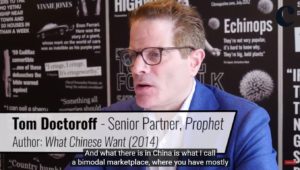China veteran Janet Carmosky pleaded earlier this week for rethinking the relationship between China hands and corporations. Corporations do not use the China expertise as well as they could, Janet Carmosky argued. Seldom you get a good illustration on what can go wrong, presented on your TV-screen in the same week, as happened to some of the China adventures of
retailer HEMA.
Earlier today we already made fun of the company, who focuses on a retail concept where affordable commodities of a decent quality are sold to low-earning customers. That works pretty alright in the Netherlands and Belgium, where they have their largest operation. But they are owned by
investment bank Lion Capital, and that means they have to grow, grow, grow, even if that kills the company.
My information is based on the
documentary "The Secret of HEMA". Recordings took place during a whole years and that means the viewers do not have a complete picture. In fact, some of the rather stupid decisions could make sense, if you would know the whole picture.
According to my assessment their retail concept would not work in China, but pressure from the investment bankers might force the HEMA management to make decisions that are less than smart, as I discussed in the earlier post.
A shocking event in the documentary is a visit to one of their major suppliers. HEMA sources much of their textile and other commodities in China, so a visit to the larger supplier would make sense. The HEMA CEO Ronald van Zetten meets his Chinese counterpart, and he brings a box of cheap cookies from their store as a present. The lady, the translator/assistant, gets a similar box.
That is two mistakes in one: if you are going to meet the CEO of a large supplier, you can come up with something better than cheap Dutch cookies, he probably does not like anyway. And second, you do not give somebody lower in the hierarchy the same present. Those are small things, but easy to avoid.
Being an ignorant Dutch CEO gives you some leeway in China, but it looked pretty stupid. And that was only the start.
Van Zetten skips all the traditional pleasantries you need in China to break the ice. He starts the conversation by asking whether his supplier, since they have already a long-term trusted relationship, wants to become a partner in his planned retail operation.
There is not really an indication that the supplier has also experience in setting up a retail operation. Manufacturing is a different ball game than retail. What seems to happen - and that is all to common - is that business is offered to the first Chinese you trust.
The Chinese CEO does not look too surprised, but praises the plan as an excellent idea and offers his services. Expecting that he would have said differently - even when the idea is obviously heading for a failure - is a wrong idea. Chinese do not mind to tell you the truth, but not at your first visit to China.
Hey, I'm Dutch, and if somebody would propose such a plan, involving millions of investments, I would likely be on the conservative side telling the truth.
Even if the HEMA had assigned a decent due diligent research into the retail capabilities of their supplier, the idea seems less than smart. When you set up a retail operation with your supplier, you jeopardize both operations if one of them goes bad. Putting your eggs in different baskets is very important.
But the HEMA people leave the premises smiling, and think they have concluded a smart deal.
Later in the documentary, management has decided to leave their suppliers in China, and move their sourcing operation to Turkey. Middle management is unhappy, since they lose a trusted partner in China, they were very familiar with and offered good products and kept all the deals. The documentary maker here fails to ask what is happening to the retail operation, although that seems pretty important.
Again later in the documentary, supplies from Turkey do not meet the quality standards, and they cannot deliver the volume needed for a larger retailer like HEMA. The relationship with the Chinese suppliers already has been screwed up, before Turkey fails to deliver, so they now have to go back to China, at least for the near future.
Getting things right in corporate life is a challenge, and sometimes for obvious reasons stupid decisions have to be made. But I would have guessed HEMA would have been better off by listening to some China hands, and sometimes listening to them too.





